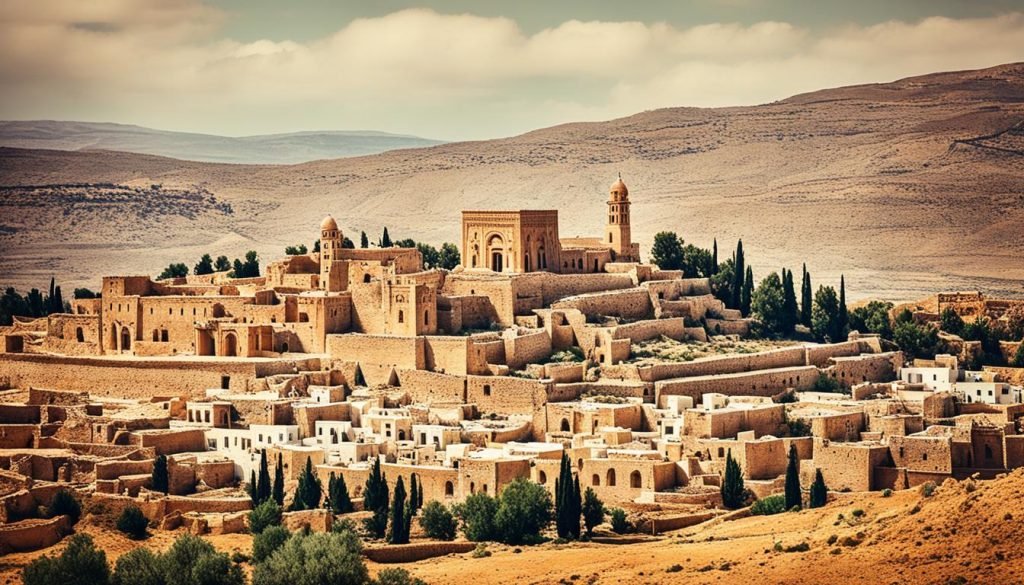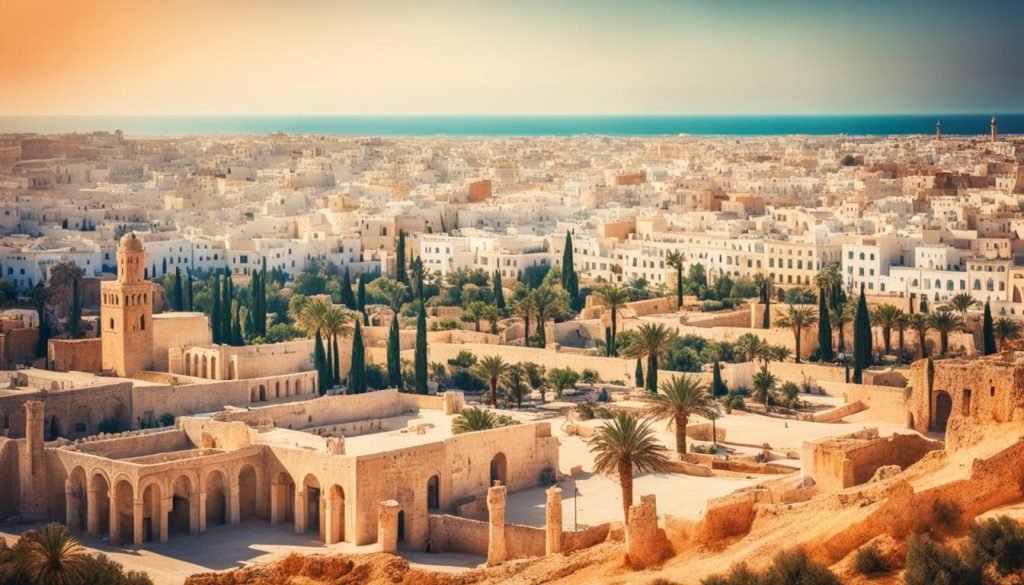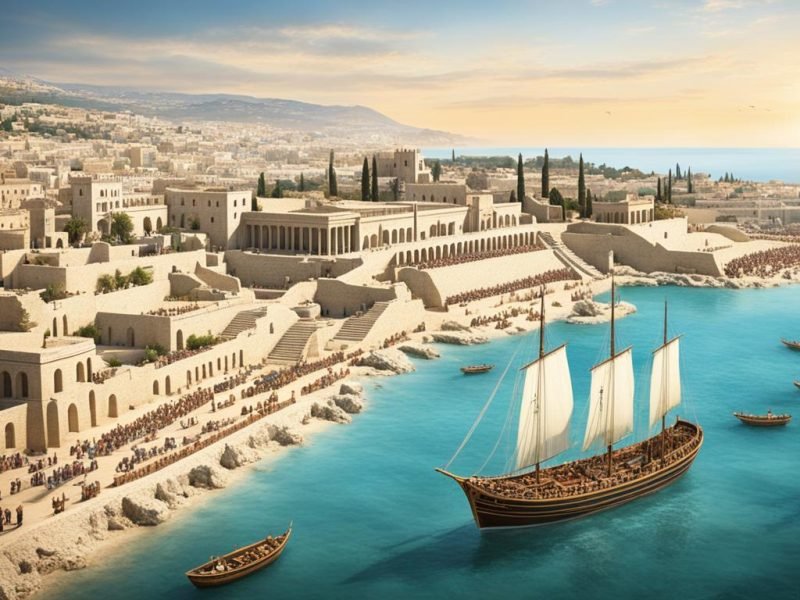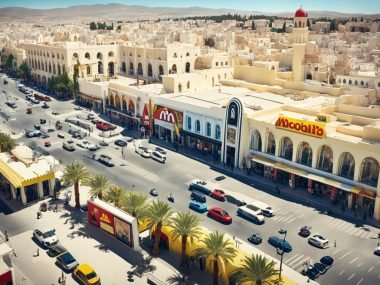I love studying the Maghreb area’s history. I find it fascinating how deeply Tunisia’s origins go back. This mix of local and foreign influences is clear in its name. I think the story behind Tunisia’s name is more than just history. It shows how strong and diverse people can be.
The Republic of Tunisia has a rich history of empires and important trade routes. It’s located at Africa’s top, making it key in the Mediterranean area. The name “Tunisia” comes from the city of Tunis. This city, with stories of different ages, started as a small Berber place. Over time, it included the cultures of Phoenicians, Romans, and Arabs.
Some think “Tunisia” is linked to the Carthaginian god Tanith or the city of Tynes. After Tunisia got independent, the French added “-ia” to Tunis to make “Tunisia.” This change marks how the name gained worldwide use. I’m excited to share more about how Tunisia got its name.
Key Takeaways
- The name “Tunisia” is steeped in a colorful tapestry of Tunisian history and culture.
- “Tunis” signifies more than a city; it is a focal point from which the country’s name unfurled through time.
- Berber roots hint at an original meaning related to “encampment,” showcasing the area’s early function.
- Cultural imprints of past civilizations continue to resonate in the modern name of Tunisia.
- French colonial linguistics left a lasting impact, transforming “Tunis” into “Tunisia.”
- The wide adoption of the name post-independence reflects both a rejection and a reclamation of colonial influence.
The National Identity and Symbolism of Tunisia’s Name
Exploring the national identity and symbolism of Tunisia’s name is key. It shows us Tunisia’s rich background and important past. By looking closely, we find the real meanings behind Tunisia’s symbols and name.
An Overview of Tunisia’s National Symbols
The flag and coat of arms mean a lot to Tunisia. They show its independence and the struggles for a national identity. The symbols stand for Tunisian values and hopes. The flag’s red and white colors show energy and innocence. The crescent and star speak of Tunisia’s Islamic roots.
Tunisia’s National Motto and Anthem
The motto “Freedom, Order, Justice” and the anthem “Defenders of the Homeland” are key. They are part of Naming of Tunisia and its goals. These words are not just formalities but have deep meaning for Tunisians. They reflect Tunisia’s history of bravery and desire for peace.
The Role of the Capital City Tunis
The city of Tunis is more than the country’s name source. It’s a living record of Tunisia’s journey and culture. Its history is linked to explaining Tunisia’s name. Tunis has been pivotal from old times to today, shaping both the area and the nation’s character.
The Indigenous Roots: Berbers and Early Inhabitants
Exploring Tunisia origins, we find the deep Berber legacy. This has greatly shaped the country. The Berbers, Tunisia’s ancient people, set up a foundation. It still affects the country’s culture and how society works today.
Tracing Back to the Berber Tribes
The story of the Berbers in Tunisia is about their strong spirit and lasting cultural effect. They once lived a semi-nomadic life, shown by old sites and items found around the area. These discoveries show how advanced the Berbers were. They also show how they dealt with other ancient cultures. This helped shape the area’s unique identity.
The Influence of Early Civilizations on Tunisia
When talking about how Tunisia got its name, the Phoenicians and Romans must be mentioned. They both greatly influenced Tunisia, from Carthage’s founding to Rome’s big buildings. Their impact is woven into Tunisia’s history. It has shaped both the culture and how the country’s name is explained.

The role of these early cultures is highlighted by history and old finds. They show how important they were in making modern Tunisia. Their stories and impacts live on. They are remembered in city names and in stories, honoring what they did for the country’s past.
| Civilization | Influence on Tunisia |
|---|---|
| Berbers | Cultural foundations, social structures, and linguistic influences |
| Phoenicians | Commercial strategies, seafaring techniques, and urban development |
| Romans | Architectural achievements, administrative structures, and legal advancements |
Carthaginian and Roman Influence on Tunisia’s Nomenclature
Tunisia’s history is rich with Carthage and Rome’s legacy. They left a strong mark on Tunisia’s culture and places. Looking into Tunisia’s past, we see how history influences today’s names and culture.
The Founding of Ancient Carthage
Carthage was started in the 9th century BC by Phoenician settlers. It grew into a mighty empire, known for trade and culture. This city became a core part of what is now Tunisia. It shaped the area’s social and economic structures.
Roman Occupation and the Province of Africa
After Carthage fell, Rome took over and started a new era in Tunisia. They named the area Africa Proconsularis. It became a key agricultural center. The Roman influence can still be seen. It changed the area’s buildings and names deeply.
This history helps us understand Tunisia today. Each period adds to the country’s culture now.
| Epoch | Influence | Key Contributions |
|---|---|---|
| Carthaginian | Trade and Culture | Establishment of Carthage as a cultural beacon |
| Roman | Architectural and Agricultural | Introduction of Christianity, renaming to Africa Proconsularis |
How Did Tunisia Get Its Name?
The Origin of Tunisia’s name starts in Tunis. It’s a mix of local Berber culture and outside influences. The tale is full of conquests and stories of cultures mixing. “Tunis” may come from the Berber word for ‘encampment.’ This ties to the early people of the region.
Some also link it to Tanith, the respected Punic goddess. This adds a myth angle to Tunisia’s name story.

The “-ia” in Tunisia shows French colonial impact. It shapes how we see the country today. This ending means land or belongs to. So, “Tunisia” means ‘Land of Tunis.’ Changing “Tunis” to “Tunisia” shows how colonial pasts leave marks on places.
The name’s change isn’t just about words. It also shows big social and political changes. These shifts help tell Tunisia’s story. They show how different histories and identities meet. They shape how Tunisia is viewed around the world.
| Aspect | Significance | Impact |
|---|---|---|
| Berber Root ‘Tunis’ | Indicates the indigenous origin | Preserves historical and cultural identity |
| Punic Goddess Tanith | Symbolizes spiritual and cultural depth | Infuses mythological elements into the country’s name |
| French Suffix “-ia” | Represents colonial influence on nomenclature | Transforms regional identity into national embodiment |
The exploration of Tunisia naming story and Origin of Tunisia’s name shows a rich history of people meeting, colonial marks, and clever naming. This story is not just about the past. It also lights the way for Tunisia’s identity in the world today.
The Ottoman and French Colonial Impact on Tunisia’s Name
Tunisia’s history is rich and complex because of its time under foreign rule. This is especially true during the Ottoman Empire and the French Protectorate periods. These times added unique layers to Tunisia’s culture and name.
Tunisia Under Ottoman Rule
In the 16th century, Tunisia joined the large Ottoman Empire. Even as part of this empire, Tunisia kept a lot of its own control. This helped it hold onto its special cultural identity. Still, the Ottoman’s influence changed its social and political system. This laid groundwork for future changes in Tunisia.
The French Protectorate and Its Influence on Tunisia’s Identity
The start of French rule in Tunisia in 1881 was a big deal. It led to many changes intended to update Tunisia. However, it also challenged Tunisia’s freedom and sparked movements for independence. The French time in Tunisia was key in making “Tunisia” the official name in the world.
| Period | Impact on Tunisia |
|---|---|
| Ottoman Empire (16th Century – 1881) | Maintained autonomy, influenced social and political structures, contributed to cultural identity but not nomenclature. |
| French Protectorate (1881 – 1956) | Introduced administrative and social reforms, led to nationalistic movements, solidified the modern usage of the name “Tunisia.” |
Conclusion
In studying Tunisian history, I’ve grown to appreciate ‘Tunisia’s’ name more. This name carries the nation’s rich past. It holds the stories of many cultures. These include the Berbers, Phoenicians, Romans, and later, the Ottomans and French.
The name ‘Tunisia’ has evolved through time, showing the nation’s resilience. Understanding this tells us a lot about Tunisian identity. It’s fascinating to see.
Thinking about the Tunisia etymology shows the name’s depth. It’s not just any name. It tells the tale of a people and place that have lasted through time. The ‘-ia’ at the end suggests it’s about more than just Tunis. It’s about the whole country.
To me, saying ‘Tunisia’ is like remembering the nation’s history. It shows how different groups have touched this land.
Tunisian name meaning is more than just words. It’s about recognizing the nation’s long story. The name reflects not just a place, but a journey to modern identity. Let’s remember Tunisia’s deep history. It shows the heritage that defines Tunisia for its people and the world.







